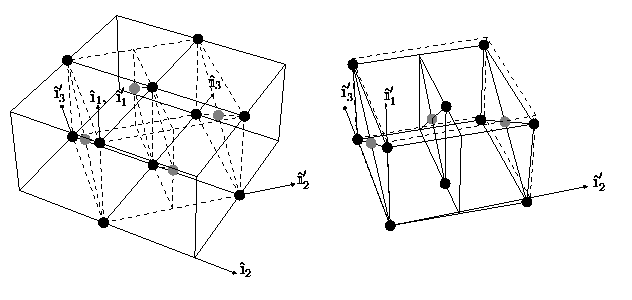
A cubic to monoclinic transition is described by four parameters: three stretches along three mutually perpendicular directions and a monoclinic angle. In general, there are two kinds of cubic-to-monoclinic transitions, but only the transition observed in Ti-Ni shape memory alloys is considered here. This is the B2 to B19' transition.
Some alloys undergoing this transition are
For Ti-Ni, the unit cells of the austenite (B2) and martensite (B19') phases look like;

Figure 1: Left: Four tetragonal unit cells in the B2 cubic lattice. Right: B19' monoclinic unit cell. The black spheres are the Ti atoms and the gray spheres are the Ni atoms.
The type of monoclinic variants for the cubic-to-monoclinic observed in Ti-Ni are called monoclinic `face-diagonal' variants [1] because the unique, two-fold symmetry axis of each variant is along a face-diagonal. In contrast, the monoclinic variants found for alloys exhibiting the so-called faulted martensite phase are monoclinic `cubic-diagonal' variants because the two-fold symmetry axes are along the edges of the cube. Of course, the type of variants present greatly affects the kinds of microstructure which are possible.
The transformation stretch matrices are the gradients of the deformations which take a cubic lattice into a monoclinic lattice. There are 12 such matrices, one for each variant of the martensite phase. One of the `face-diagonal' variants has components ,
,
where each of the components in this matrix are functions
of the stretches  ,
,
 and
and
 and the monoclinic
angle
and the monoclinic
angle  . Specific
details
can be found in reference [2]. Also,
Pitteri and Zanzotto [1] give an interesting
discussion about the two kinds of cubic-to-monoclinic transitions
and the possible twin microstructures for each.
. Specific
details
can be found in reference [2]. Also,
Pitteri and Zanzotto [1] give an interesting
discussion about the two kinds of cubic-to-monoclinic transitions
and the possible twin microstructures for each.
Here are links to various pages, where a number of different microstructures are discussed. Also contained therein is a table showing the possible microstructures for the cubic-to-monoclinic transition in a particular Ti-Ni alloy.
``Generic and non-generic cubic-to-monoclinic transitions and their twins.'' by Mario Pitteri and Giovanni Zanzotto, Acta Materialia 46, 225 (1997).
``Microstructure in the cubic to monoclinic transition in a Ti-Ni shape memory alloy.'' by Kevin F. Hane and Thomas W. Shield. To be submitted to Acta Materialia, 1998.
Top of this page.
Back to main page.